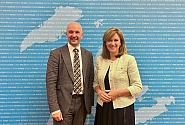
On Monday, 9 September, in the French capital, Paris, the Deputy Speaker of the Saeima, Zanda Kalniņa-Lukaševica, presented a draft report on the threats posed by foreign interference to the democratic order and security in Europe at a meeting of the Political Committee of the Parliamentary Assembly of the Council of Europe (PACE). Jānis Sārts, Director of the NATO Strategic Communications Centre of Excellence, and David Agranovich, Director of the META Global Threat Disruption, were invited as experts to the meeting. The work on the report started last year, but it is precisely at this point that the issues it deals with are particularly topical.
“Recently published information on Russia’s efforts to influence the upcoming US elections and the ongoing psychological warfare in Europe, as well as Russia’s efforts to influence the outcome of the Moldovan presidential election, once again demonstrate Russia’s ambition to interfere in the domestic policies of other countries. Russia is trying to target our political institutions, media and public discourse in order to undermine trust in democratic processes and institutions. Through its actions, Russia wants to divide the unity of Western countries and reduce their support for Ukraine, Zanda Kalniņa-Lukaševica emphasised.
Non-democratic countries use both classical methods of influence – corruption, threats to journalists and sabotage – and new tools – activities on social platforms, the development of artificial intelligence and even the instrumentalisation of migration with the aim of influencing the perception of our society, our political decisions, said Zanda Kalniņa-Lukaševica, presenting the draft PACE report.
Since 2017, META has most often identified Russia as the main source of foreign interference, followed by Iran and China. In turn, a 2023 study by the French National Assembly indicates that Russia and China use different methods in the long term to destabilise societies of other countries and control political narratives abroad.
“The main objective of authoritarian regimes is to weaken democracies internally, undermining the integrity of decision-making processes and public trust in the capacity of the state and its institutions. Social media is misused for complex information operations. This poses an existential threat to national security for all European democracies. We are facing new threats and attacks against democracies, and it is important to identify them and stand on guard,” said Zanda Kalniņa-Lukaševica when presenting the report at the Committee meeting.
Jānis Sārts, Director of the NATO Strategic Communications Centre of Excellence, and David Agranovicš, Director of Global Threat Disruption at META, shared their analysis of various identified disinformation campaigns and the use of social platforms to influence public opinion, as well as trends in the development of new technologies, including artificial intelligence, which pose additional threats to democracies and societal resilience against malicious foreign interference.
The first hearing of the report on foreign interference in democratic processes prepared by Zanda Kalniņa-Lukaševica took place at the meeting of the Political Committee of the Parliamentary Assembly of the Council of Europe. The report is expected to be finalised and approved in the course of the next year, including recommendations on the fight against malicious foreign interference.
Saeima Press Service







